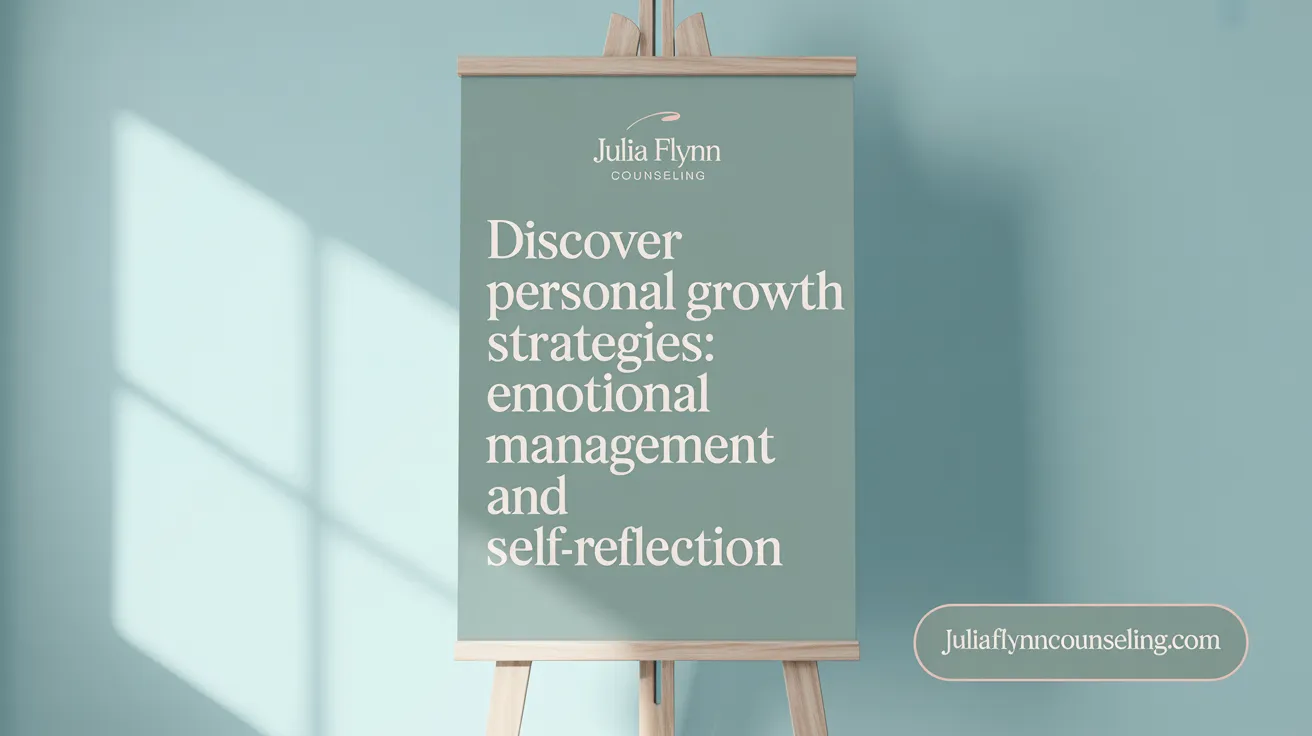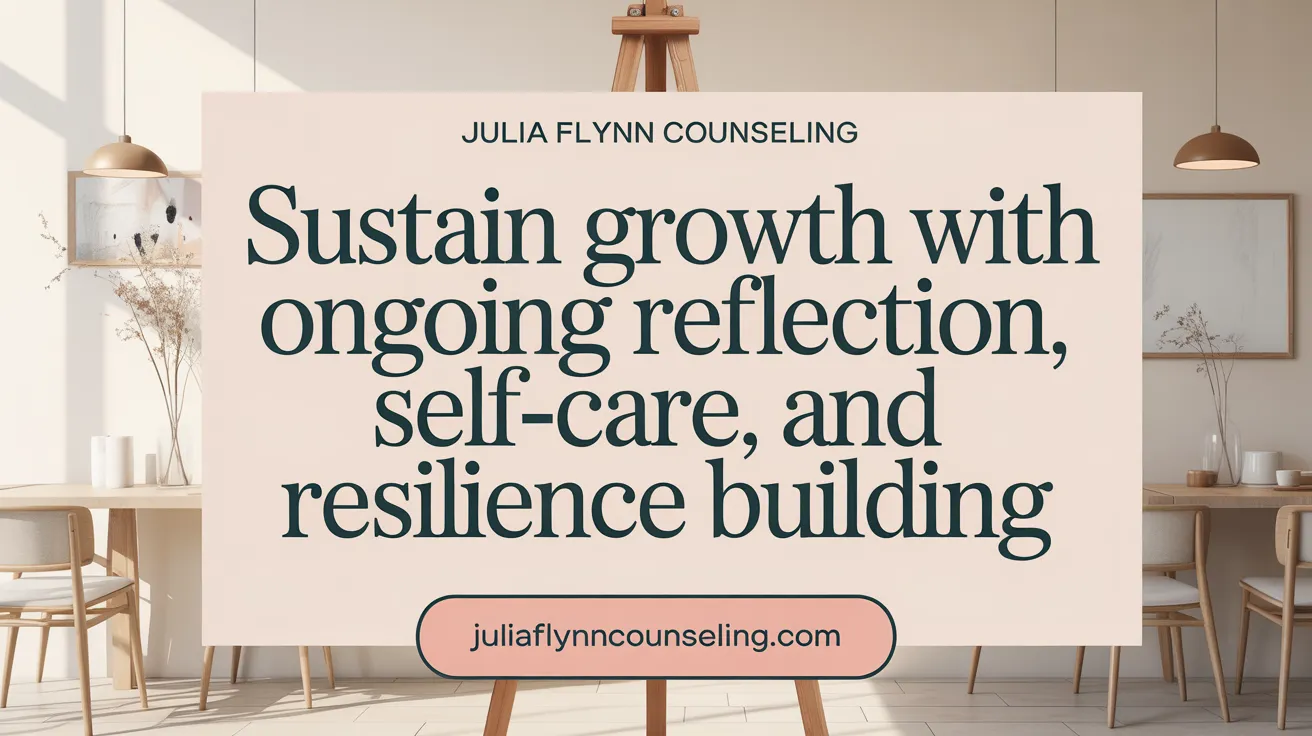The Transformative Journey of Therapeutic Support
Therapy has evolved far beyond just a treatment for mental health challenges; it is a powerful catalyst for personal growth and development. By providing a safe, confidential, and structured environment, therapy enables individuals to explore their inner worlds, overcome obstacles, and foster lasting positive change. Through a variety of therapeutic approaches, clients gain insights, develop emotional resilience, and acquire practical strategies that support lifelong growth and fulfillment.
Understanding Therapy's Role in Personal Growth and Development

How does therapeutic support contribute to personal growth and development?
Therapy offers a safe and confidential space where individuals can openly explore their emotions, thoughts, and behaviors without judgment. This environment encourages honest self-reflection, which is essential for increasing self-awareness. With a clearer understanding of their values, strengths, and goals, individuals become more empowered to make positive changes.
Through therapy, people learn to recognize and challenge limiting beliefs, boosting their confidence and fostering a healthier self-image. Developing emotional resilience is another core benefit, as individuals acquire skills like emotional regulation, stress management, and mindfulness techniques to better handle life's ups and downs.
Improved communication and relationship skills naturally follow, helping individuals set boundaries, resolve conflicts, and build stronger, more empathetic connections. These improvements contribute to healthier personal and professional relationships.
Overall, therapeutic support promotes personal growth by enabling individuals to understand themselves better, develop resilience, and pursue a more fulfilling and balanced life. It transforms challenges into opportunities for meaningful change, encouraging self-discovery and ongoing self-improvement.
Mechanisms and Benefits of Therapy for Self-Awareness and Resilience
How does therapy enhance self-awareness?
Therapy fosters self-awareness through various techniques like mindfulness exercises, journaling, guided questioning, and REFLECTION activities. These approaches help individuals explore their thoughts, identify emotional triggers, understand their behaviors, and uncover core values. As people gain deeper insight into their internal world, they become more aware of how their past experiences influence current reactions, allowing for intentional change.
What techniques support understanding thoughts, emotions, and behaviors?
Therapists often use methods such as cognitive restructuring in CBT, mindfulness-based practices, and psychodynamic exploration to facilitate understanding. These techniques encourage honesty and curiosity about inner experiences, helping individuals recognize patterns and underlying emotional issues. This understanding serves as a foundation for personal growth and improved mental health.
How does therapy improve emotional regulation and coping skills?
Through targeted training in emotional regulation, therapy helps clients develop tools like breathing exercises, emotional expression, and cognitive restructuring. These strategies assist in managing intense feelings, reducing stress, and handling adversity more effectively. Coping strategies learned in therapy—such as mindfulness, relaxation exercises, and problem-solving skills—empower individuals to maintain their mental well-being during challenging times.
What role does therapy play in building resilience and adaptive problem-solving?
Therapy emphasizes resilience by teaching how to adapt to stress and setbacks through skill-building activities. Clients learn to approach problems with a solution-oriented mindset, analyze challenges objectively, and develop effective strategies to overcome obstacles. Regular practice of these skills increases confidence and prepares individuals to recover quickly from setbacks.
How does therapy foster authenticity and self-acceptance?
Engaging in therapy encourages honest self-reflection and acceptance of oneself, including flaws and strengths. This process nurtures authenticity—living in alignment with one’s true values—and promotes self-compassion. As people accept their authentic selves, they often experience increased fulfillment and personal satisfaction.
| Techniques Used | Focus Areas | Benefits |
|---|---|---|
| Mindfulness & Reflection | Self-awareness, emotional insight | Deeper understanding of thoughts and feelings, reduced reactivity |
| Cognitive & Behavioral Strategies | Emotional regulation, behavior change | Better stress management, healthier habits |
| Compassion & Acceptance | Self-acceptance, authenticity | Improved self-esteem, personal growth |
| Problem-solving & Resilience Training | Handling setbacks, adaptability | Greater confidence, resilience against life’s challenges |
Therapy offers a comprehensive set of mechanisms that help individuals understand themselves better and develop resilience. These tools support continuous personal development, enabling people to live more authentic, emotionally balanced, and fulfilled lives.
Key Personal Growth Strategies Facilitated by Therapy

Which personal growth strategies are facilitated by therapy, such as emotional management and goal setting?
Therapy plays a vital role in fostering personal growth through several effective strategies. One of the main components is promoting self-awareness, which allows individuals to better understand their thoughts, feelings, and behaviors. This self-exploration is crucial for identifying emotional triggers and learning how to manage emotions effectively.
A significant focus of therapy is developing emotional regulation skills. Techniques such as cognitive restructuring and mindfulness practices help individuals cope with stress, reduce anxiety, and handle emotional challenges more effectively.
Goal setting is another essential aspect. Therapists assist clients in defining clear, achievable objectives through structured frameworks like SMART goals (Specific, Measurable, Achievable, Relevant, Time-bound). This process encourages motivation, accountability, and a sense of progress.
Evidence-based approaches like Cognitive Behavioral Therapy (CBT) and Acceptance and Commitment Therapy (ACT) support behavior change by helping clients challenge limiting beliefs, adopt healthier thought patterns, and build resilience.
Beyond emotional and behavioral improvements, therapy enhances interpersonal skills such as communication, boundary setting, and conflict resolution. Improving these skills leads to healthier relationships and increased self-compassion.
Furthermore, therapy encourages reflection on personal values and life purpose. Clarifying core beliefs helps align actions with true identity, fostering confidence and a deeper sense of fulfillment.
Overall, therapy offers a structured, supportive environment where individuals can pursue meaningful personal development. By integrating emotional regulation, goal-setting, self-awareness, and interpersonal skill development, therapy equips clients with tools that support continuous growth and resilience.
Therapy’s Support Through Life Transitions and Relationship Improvement

How does therapy support individuals in navigating life transitions and improving relationships?
Therapy offers a safe space for individuals facing major life changes, such as moving to a new city, starting a new job, ending a relationship, or experiencing loss. It provides a confidential environment where people can openly explore their emotions, fears, and uncertainties associated with these transitions.
During therapy, individuals learn to develop effective coping strategies tailored to their unique needs. Techniques like mindfulness practices, stress management exercises, and emotion regulation skills help clients adapt more smoothly to change. For example, mindfulness can foster presence and calmness, making it easier to handle anxiety or sadness.
Therapists also guide clients in improving communication skills and setting healthy boundaries. This not only aids in managing personal relationships but also helps develop empathy and understanding toward others. As a result, individuals can navigate conflicts more effectively and build stronger bonds.
Validation of emotions is a crucial part of therapy. Clients are encouraged to recognize and accept feelings such as anxiety, fear, or sadness, which facilitates processing and healing. This emotional validation helps reduce feelings of isolation and increases resilience.
Ultimately, therapy supports a positive adjustment to life changes by fostering emotional growth and interpersonal skills. Clients often emerge from therapy better equipped to handle future challenges, sustain meaningful relationships, and maintain their well-being amid life's uncertainties.
Diverse Therapeutic Models and Their Roles in Personal Development
What are the different models of therapy, including individual and group therapy, and how do they contribute to personal development?
Various therapy approaches serve different purposes, but all aim to promote personal growth, emotional well-being, and resilience. Individual therapy offers a private, focused environment where individuals can explore their thoughts, feelings, and past experiences deeply. Techniques like Cognitive Behavioral Therapy (CBT), Psychodynamic Therapy, and EMDR help uncover underlying issues, challenge negative thought patterns, and facilitate healing from trauma.
Group therapy, on the other hand, involves multiple participants sharing experiences under professional guidance. It provides social support, fosters interpersonal learning, and enhances social skills. Participants gain insights from others' journeys, build empathy, and work through common issues such as addiction or anxiety in a communal setting.
Both models utilize evidence-based techniques such as Mindfulness-Based Stress Reduction (MBSR) and Acceptance and Commitment Therapy (ACT), which improve emotional regulation and perspective. The importance of the therapeutic relationship, characterized by trust and collaboration, cannot be overstated. It creates a safe space for honest self-reflection and change.
Tailoring therapy to individual needs and goals enhances its impact. For example, some may benefit from the insight-focused nature of psychodynamic therapy, while others may prefer skills-based approaches like CBT or ACT. This diversity allows therapy to address a range of issues, developmental stages, and personal aspirations, ultimately supporting more meaningful and lasting personal development.
| Model of Therapy | Focus/Technique | Contribution to Personal Development | Ideal For |
|---|---|---|---|
| Individual Therapy | Deep self-exploration, tailored plans, CBT, EMDR | Enhances self-awareness, resolves trauma, challenges negative patterns | Personal growth, trauma healing |
| Group Therapy | Peer support, shared experiences, mindfulness practices | Builds social skills, empathy, sense of belonging | Social skills, substance abuse, anxiety |
| Evidence-Based Techniques | CBT, ACT, MBSR, EMDR | Develop coping skills, emotional regulation, insight | Wide-ranging issues |
| Therapeutic Relationship | Trust, collaboration | Fosters safety and openness for change | All therapy types |
Exploring these diverse therapeutic models enables individuals to select approaches aligned with their specific needs, fostering holistic personal development and resilience.
Goal Setting, Tracking, and Accountability in Therapy for Sustained Growth

How to define realistic and measurable goals?
Setting achievable goals is essential for effective therapy. Realistic goals consider your current circumstances, strengths, and limitations. They should be clear and specific, enabling you to track progress easily.
Goals that are overly broad or vague can hinder motivation. For example, instead of saying "I want to be happier," a measurable goal would be "I want to reduce my daily stress levels by practicing mindfulness for 10 minutes each morning."
How can the SMART framework be used in therapy?
The SMART framework helps create effective goals that foster progress. SMART stands for:
| Aspect | Explanation | Purpose |
|---|---|---|
| Specific | Clearly define what you want to accomplish | Focuses efforts and reduces ambiguity |
| Measurable | Set criteria to track progress | Maintains motivation and provides feedback |
| Achievable | Set realistic targets | Ensures goals are attainable |
| Relevant | Align goals with personal values and life context | Makes goals meaningful |
| Time-bound | Establish deadlines | Creates urgency and commitment |
Applying SMART goals helps foster commitment and clarity, making it easier to stay focused.
How to break goals into manageable steps?
Large goals can seem daunting, so breaking them into smaller, manageable tasks encourages steady progress.
For example, if your goal is to improve communication skills, smaller steps might include:
- Attending a communication workshop
- Practicing active listening in daily conversations
- Recording and reviewing conversations for improvements
This staged approach increases confidence and keeps you motivated.
What is the role of the therapist in motivation and accountability?
Your therapist plays a vital role in guiding, motivating, and holding you accountable. They help clarify your goals, develop personalized strategies, and provide encouragement.
Therapists track your progress, celebrate achievements, and discuss setbacks openly. They can also modify goals if needed, ensuring continuous growth.
Why are regular evaluations and refining strategies important?
Regular assessments allow you and your therapist to review your progress, determine what’s working, and adjust plans as needed. This ongoing process helps maintain focus, adapt to new challenges, and keep motivation high.
Refining strategies ensures that goals remain relevant and achievable, supporting long-term personal growth.
Sustaining Personal Growth Through Therapeutic Skills and Reflection

How do systematic self-reflection and self-care support ongoing personal development?
Self-reflection and self-care are vital components of maintaining personal growth over time. Therapy equips individuals with tools for regular self-assessment, helping them recognize progress and identify areas for improvement. By engaging in honest reflection, individuals develop greater awareness of their thoughts, emotions, and behaviors, leading to more intentional choices and healthier habits.
Practicing self-care, including stress management techniques like mindfulness, relaxation exercises, and balanced routines, strengthens resilience. Consistently applying these strategies helps sustain emotional stability, reduce burnout, and foster a positive self-relationship. Regular self-assessment and self-care create a cycle of continuous improvement, making growth a lifelong pursuit.
How can developing long-term coping strategies enhance personal resilience?
Building robust coping strategies is crucial for handling life's inevitable challenges. Therapy helps individuals identify personal triggers and stressors, then develop effective responses such as grounding techniques, emotional regulation skills, and problem-solving approaches.
These coping mechanisms empower individuals to face adversity with confidence, reducing anxiety and preventing setbacks. Incorporating techniques like mindfulness-based stress reduction (MBSR) and cognitive restructuring into daily routines ensures that these strategies remain accessible and effective long-term.
In what ways does building emotional intelligence and resilience foster personal growth?
Enhancing emotional intelligence involves understanding and managing one's emotions, as well as empathizing with others. Therapy fosters this development by encouraging honest self-reflection, improving communication skills, and increasing awareness of emotional triggers.
Resilience, the ability to bounce back from setbacks, is cultivated through problem-solving, perspective shifting, and emotional regulation techniques learned during therapy. Strengthening these qualities enables individuals to adapt to change, recover from stress, and maintain motivation in pursuit of their goals.
How does continuous adaptation and problem-solving support ongoing development?
Life constantly presents new challenges and opportunities for growth. Therapy encourages a mindset of flexibility and proactive problem-solving. By revisiting goals, refining strategies, and embracing change, individuals remain open to personal evolution.
Regular assessment of progress and obstacles helps tailor approaches that suit changing circumstances. Developing resilience in this dynamic way ensures sustained personal development, even amidst setbacks or transitions.
Why are fostering self-compassion and authenticity essential for lasting personal growth?
Self-compassion involves treating oneself with kindness and understanding, especially during setbacks. Therapy helps individuals recognize self-critical patterns and replace them with supportive mindsets that promote healing and confidence.
Living authentically means aligning actions with true values and passions. Therapy supports this by clarifying personal beliefs and encouraging genuine self-expression. Together, self-compassion and authenticity deepen self-acceptance, cultivate inner peace, and sustain motivation for continued growth.
Empowering Lifelong Growth Through Therapeutic Support
Therapeutic support offers a comprehensive foundation for personal growth by combining self-exploration, emotional healing, and practical skill development. Through individualized guidance and diverse therapeutic approaches, individuals gain the tools necessary to enhance self-awareness, navigate challenges, and build resilient, fulfilling lives. Whether facing life transitions or pursuing deeper self-understanding, therapy nurtures lasting change, fostering motivation, authenticity, and healthier relationships. Embracing therapy as a partner in personal growth enables individuals to unlock their potential and sustain progress throughout their life's journey.
References
- Personal Growth Starts With One Therapy Session
- The Impact of Mental Health Therapy on Personal Growth
- How Therapy Can Help You Achieve Personal Growth
- The Benefits of Therapy for Personal Growth I CMHS
- Personal Growth and Healing: The Role of Individual ...
- The Benefits of Therapy for Personal Growth and Resilience
- Why Therapy Is Ideal for Personal Growth - Flourish Asheville
- Self-Improvement & Personal Growth
